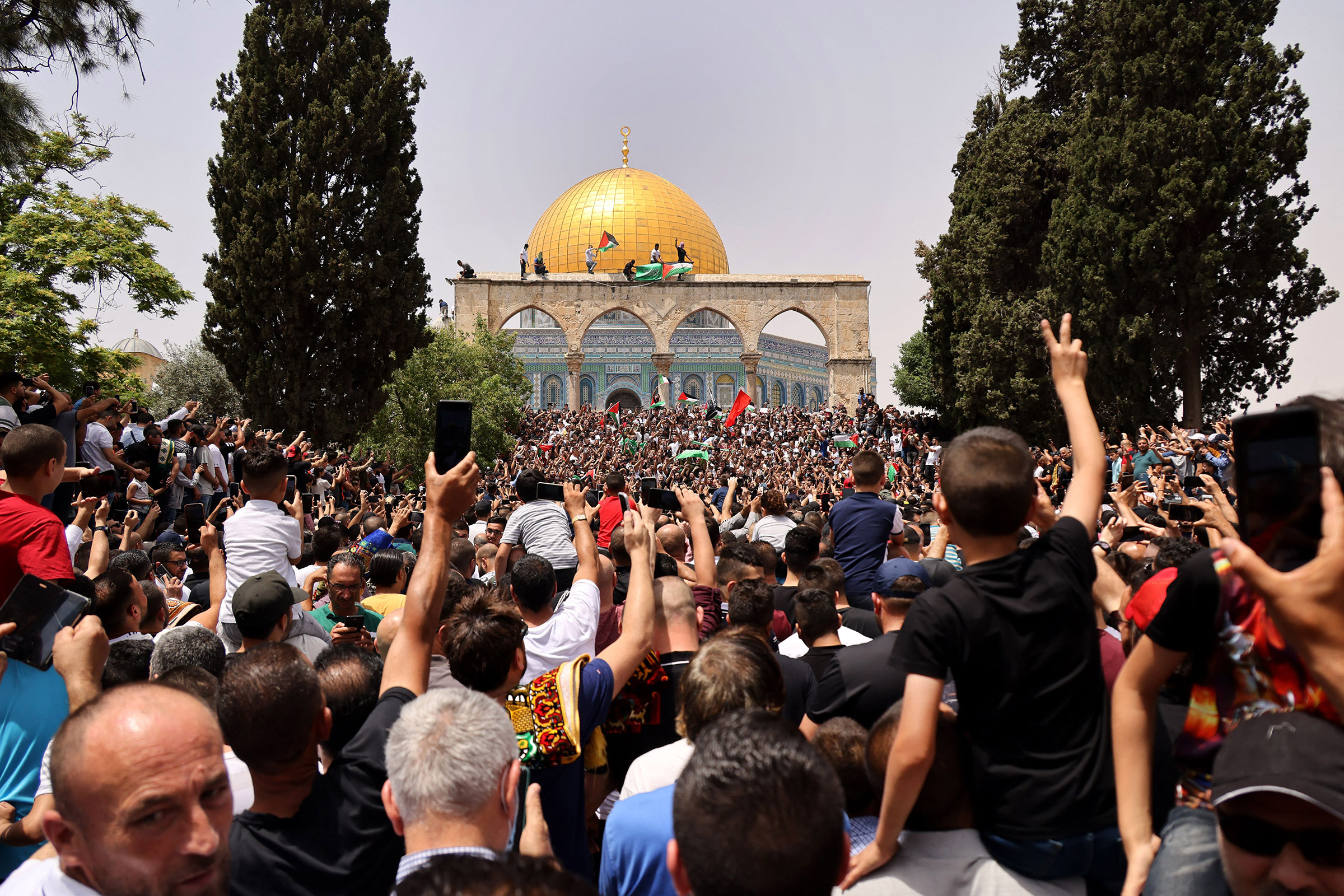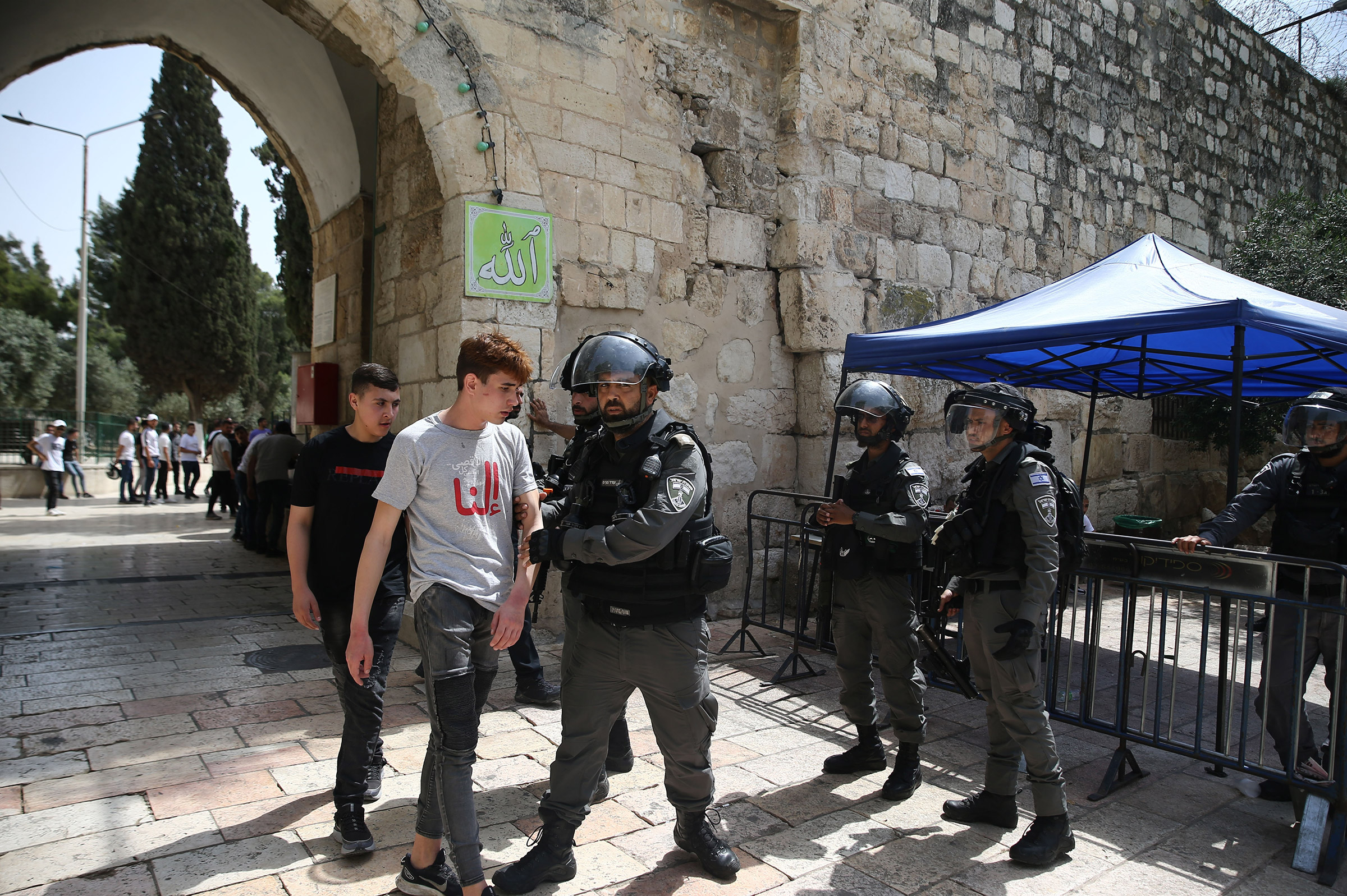Senior Facebook executives apologized to the Palestinian Prime Minister Mohammad Shtayyeh in a virtual meeting on Tuesday, after officials complained to the company about Palestinian posts being blocked amid the conflict with Israel, according to a diplomat who facilitated the meeting.
Palestinian officials left the meeting on Tuesday with the impression that Facebook had admitted there was an “inherent issue with their algorithms” and that they had promised to address it, according to an account of the meeting shared with TIME by Husam Zomlot, the head of the Palestinian mission to the U.K.
As tensions rose between Israel and Palestine earlier this month, Instagram restricted access to Arabic-language posts and hashtags that mentioned Al-Aqsa mosque, the third-holiest site in Islam. The mosque in Jerusalem had been the site of recent Palestinian protests amid high communal tensions in the city. Posts mentioning Al-Aqsa were removed as Israeli police were clashing with Palestinian protesters there, leaving more than 300 people injured.
Instagram, which is owned by Facebook, later restored many of the posts mentioning Al-Aqsa, saying the takedowns had been a mistake. “[The] hashtags were restricted in error,” a company spokesperson told regional news outlet The National. In internal posts obtained by BuzzFeed, Facebook reportedly said the mistake had been made by an artificial intelligence system that mistook posts mentioning the mosque for references to a banned terror group.

Zomlot said that Facebook’s team, which was led at the meeting by the company’s vice president for global affairs Nick Clegg, acknowledged that Facebook had inaccurately labeled certain words commonly used by Palestinians, including “martyr” and “resistance,” as incitement to violence. “They promised they would revisit and reevaluate their framework,” Zomlot said. The meeting was also attended by Facebook’s vice president for global public policy, Joel Kaplan, and its Middle East and North Africa policy chief Azzam Alameddin.
In response to questions from TIME, a Facebook spokesperson did not deny that Clegg’s team had apologized to the Palestinian side for the Al-Aqsa episode, nor that the company had committed to revisiting and reevaluating the way it dealt with similar posts and language.
Read more: Facebook Says It’s Removing More Hate Speech Than Ever Before. But There’s a Catch
“Our thoughts are with everyone affected by the horrific ongoing violence,” the spokesperson said in a statement to TIME on Friday. “In response to the violence we are working to make sure our services are a safe place for our community. We will continue to remove content that violates our Community Standards, which do not allow hate speech or incitement to violence, and will proactively explain and promote dialogue on these policies to policymakers. We are also actively working to respond to concerns about our content enforcement. These meetings are an effort to ensure that all parties are aware of steps the company has taken, and will continue to take, to keep the platform safe.”
But activists allege that Facebook is complicit in a systemic pattern of suppression against Palestinian voices on Facebook and Instagram–one that rose in intensity as Israel began a military campaign against Hamas that left at least 219 people dead in Gaza, including 63 children, according to the territory’s health ministry. On the Israeli side, health authorities put the death toll at 12, including two children.

As well as the Al-Aqsa hashtags being blocked, as the conflict escalated many Arab users on Instagram and Facebook complained of being unable to share live video, having innocuous posts wrongfully removed for alleged hate speech, and content mentioning “Palestine” reaching fewer viewers than normal, according to public posts and screenshots shared with TIME by Access Now, a digital rights group. “Social media companies often gaslight us into believing that these are just technical errors, and expect us to move on,” says Marwa Fatafta, the Middle East and North Africa manager for Access Now. “For them, it’s anecdotal, but we see the volume. Everyone I know has had some form of censorship when they talk about Palestine.”
Activists say that while Facebook’s suppression of many Palestinian posts may or may not be intentional, it nevertheless reflects the huge power imbalance between Israel and the Palestinians in which, they say, Facebook has naturally gravitated toward the richer, more powerful, and better-organized side. The impact, activists say, is reflected not only in Facebook’s business interests, but its policies and the algorithms that enforce them.
Facebook has offices in Israel. It also has a public policy director for Israel and the Jewish diaspora, Jordana Cutler, who used to work as an adviser to Israeli Prime Minister Benjamin Netanyahu. “My job is … to speak at Facebook on behalf of Israel and the Jewish diaspora,” Cutler told the Jerusalem Post in 2020. “We have meetings every week to talk about everything from spam to pornography to hate speech and bullying and violence, and how they relate to our community standards,” she said. “I represent Israel in these meetings.” Facebook does not have a dedicated public policy director for Palestinians; they fall under the remit of its Middle East and North Africa policy chief, Azzam Alameddin, who is based in Dubai.
Read more: How a Palestinian Uprising Against Israeli Forced Evictions Spiraled Rapidly Toward ‘Full-Scale War’
Five days before Facebook met with the Palestinian Prime Minister, a Facebook delegation including Cutler, Clegg and Kaplan met with the Israeli Justice Minister, Benny Gantz. (Alameddin did not attend.) At that meeting, on May 13, Gantz pressured Facebook to take even stricter action against “extremist elements that are seeking to do damage to our country,” according to a statement from his office. “Gantz called upon them to commit to removing content from their social media sites that incites to violence or that spreads disinformation, and emphasized the importance of responding quickly to appeals from the governmental cyber bureau,” the statement said.
An official in the Israeli Justice Ministry told TIME on Friday that in the week since meeting with Facebook, they had noticed an improvement in the speed with which Facebook had dealt with Israeli takedown requests. “Ahead of the meeting, the Ministry of Justice was disappointed with how Facebook was responding,” the official said. “During the meeting, however, they did voice a willingness to respond more assertively, fully and quickly, and subsequently there has been some improvement. We would like to see even greater responsiveness going forward.”
Facebook already cooperates closely with the Israeli government’s cyber unit, which was established in 2015 to systematically report content to social media platforms that the Israeli security services deem objectionable, saying they contravene the companies’ rules. In 2020, Facebook approved 81% of the unit’s takedown requests, according to 7amleh, the Arab Center for the Advancement of Social Media, an activist group that logs and helps users appeal wrongful takedowns. “The follow up question to platforms, of course, is how many posts they are removing in advance of being asked … so as to avoid being asked,” said Evelyn Douek, a platform regulation expert at Harvard Law School, in a tweet.

And through a smartphone app promoted by the Israeli government, pro-Israel volunteers regularly participate in mass-reporting campaigns against Palestinian content perceived to be endorsing violence. “Basically they get notifications to report certain content,” says Nadim Nashif, executive director of 7amleh. “In most cases, they do not really understand what’s in it, because they don’t speak Arabic, but they automatically report it. The platforms get thousands of reports, and often take it down because of the volume of reporting. So it’s a matter of how you manipulate the system.”
Activists say that because Palestinians do not have similar resources, the extent of Facebook’s cooperation with Israel leads to an imbalance in the way it designs and implements its policies. On May 14, the Intercept revealed the existence of previously-unreported Facebook rules that allow for the removal under hate speech rules of the term “Zionist” in certain contexts. “We allow critical discussion of Zionists, but remove attacks against them when context suggests the word is being used as a proxy for Jews or Israelis, both of which are protected characteristics under our hate speech policy,” the company said in a statement to the Intercept.
“Facebook functions in a way where if one side in a conflict is well-organized, wealthy, has the manpower and the resources, it’s very easy to manipulate content and suppress different narratives,” says Nashif. “The Palestinian side is less well-organized than the Israeli side, it’s weak, it doesn’t have the money. They don’t have a sophisticated cyber unit with hundreds of workers, and sophisticated technologies. This is very similar to what has happened in Myanmar and India and other places. It’s the same pattern of power relations being reflected in social media.”
Activists also worry that the power imbalance between Israel and the Palestinians may be perpetuating itself by seeping into Facebook’s content-removal algorithms, which work by trying to spot patterns in content that has been previously removed for breaking the site’s rules. “All discussions around AI right now are based on the truism that if you put garbage data in, you get garbage outputs,” says Dia Kayyali, associate director of advocacy at Mnemonic, a digital rights group. “So what is the data being fed into the AI that is impacting Palestinians? Where is that data coming from?”
A Facebook spokesperson declined to answer a question from TIME about whether content removed from Facebook after being reported by Israel’s cyber unit was used as training data for the company’s content-moderation algorithms.
Zomlot, the Palestinian diplomat, said he had raised the issue of algorithmic bias with Facebook. “The Israeli military machine is feeding their algorithms, absolutely,” he told TIME. “And the main purpose is to stifle the Palestinian voices about anything that has to do with injustices.”
More Must-Reads from TIME
- Caitlin Clark Is TIME's 2024 Athlete of the Year
- Where Trump 2.0 Will Differ From 1.0
- Is Intermittent Fasting Good or Bad for You?
- The 100 Must-Read Books of 2024
- Column: If Optimism Feels Ridiculous Now, Try Hope
- The Future of Climate Action Is Trade Policy
- FX’s Say Nothing Is the Must-Watch Political Thriller of 2024
- Merle Bombardieri Is Helping People Make the Baby Decision
Write to Billy Perrigo at billy.perrigo@time.com